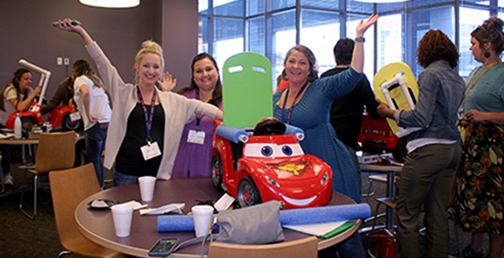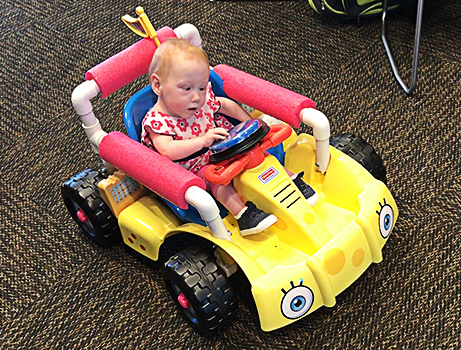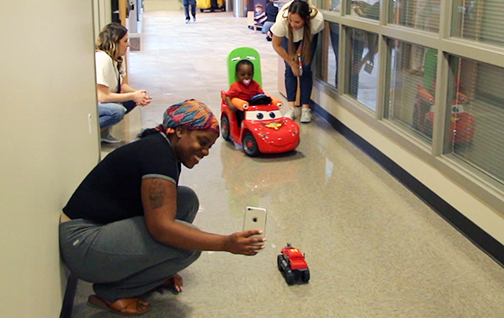“Mobility is a basic human right, and occupational therapists recognize the importance of it because mobility contributes to social, cognitive, and communication development of children,” notes Kerrie Ramsdell, MS, LOTR, Assistant Professor of Occupational Therapy at LSU Health New Orleans School of Allied Health Professions. “Children who have limited mobility are at increased risk for more delays in these three areas. By offering power mobility, we have the ability to aid the overall development of children with motor impairments.”
And that is the goal that drove Dr. Cole Galloway to develop the Go Baby Go Program at the University of Delaware in 2012. Dr. Sam Logan worked as a fellow in his lab. The community-based research design and outreach program modifies motorized cars for young children with limited mobility.
“A child's main occupation is play, which enables him or her to learn and grow!” Ramsdell says. “It is imperative that all children be able to explore their surroundings with as little restriction as possible to foster healthy interactions and create a safe learning environment.”

Then, faculty, students and parents got to work on the cars, with help from Laura Stazio, a biomedical engineer who is on the Human Development Center faculty. Sponsor Numotion donated the 6v cars that work best for children 6 months to 3 years old. The teams made modifications to meet the level of support needed by each child. The starters on these cars are up on the steering wheels, so foot pedals are not needed. The teams added seatbelts, upright backrests, bumpers and other safety features as well.

"I think she's going to love it," said Martha Webb, 16-month-old Caidence's grandmother. "It gives her some freedom to get up off the floor."
Some of the kids couldn't wait to get in their cars and go.
"He's going to love it," predicted Button Jones, whose son, Jed, age 2 couldn't wait. "We're never going to get him off of it!"
"He loves to chase his big brother around and he can't right now," said Angie Pilgreen, mother of son Kyle, age 3. "This will help him keep up. We put his brother on a bike, and now we can put Kyle in his car."
"I think this is amazing for him," said Angelica Collazo, mother of Jahriel, age 1.5. "It makes him feel independent and more like the other 'normal' children. This is amazing. I really appreciate it."
Each family was given the ride-on car adapted for their child who can now use it for active mobility at home.

Ramsdell has worked with the Go Baby Go Program to become a regional site. "We will be able to help Louisiana families and those around the Gulf Coast get adapted ride-on cars. And by having it at LSU Health New Orleans School of Allied Health Professions' Human Development Center, we can meet the family’s needs in an interdisciplinary model that promotes learning through collaboration. Families can reach out to me at kramsd@lsuhsc.edu or geauxbabygeaux@gmail.com."
After using the car at home, Webb adds, "This program gives mobility and quality of life to children who can't move on their own. It gives them a sense of independence and, in our case, joy. Seeing the look of anticipation and excitement on our child's face when she gets to drive her car is just amazing! We're so grateful she was approved to be a part of it.”
To learn more, visit the Geaux Baby, Geaux! Facebook page, or to donate, click here and select Geaux Baby Geaux in the dropdown box.
